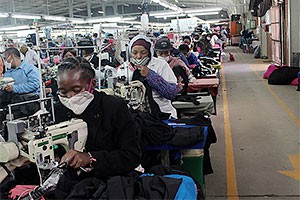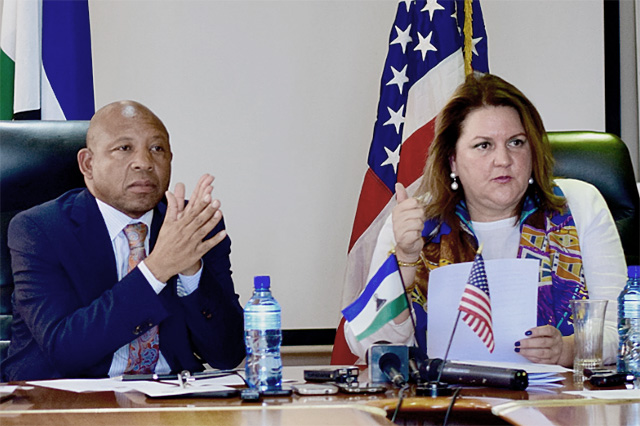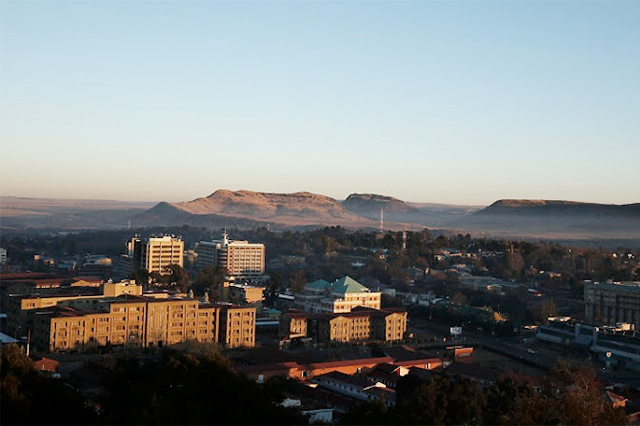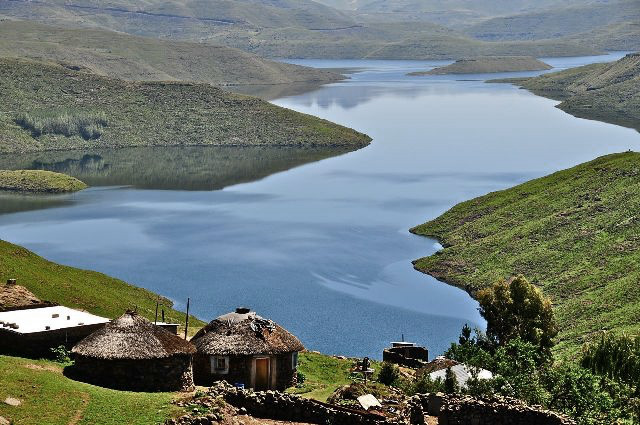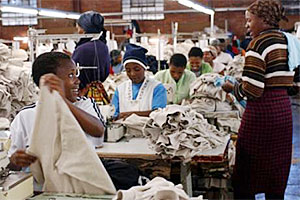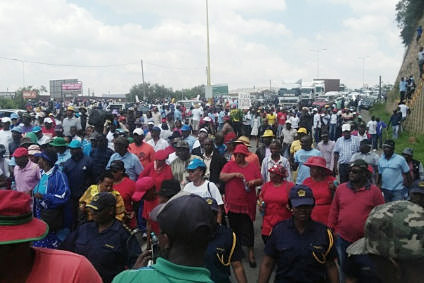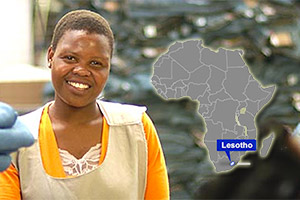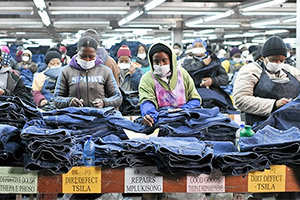In Lesotho, evidence of US trade deal's success, and its limits
Most months, Mamoleboheng Mopooane’s paycheck passes through her hands like water.
There are her children’s school fees and groceries, rent, winter jackets, and the open palms of unemployed relatives back home asking again and again if she can spare just a little something, anything, to help them get by.
All of that is a lot to ask of the $100 she earns every month stitching seams into American bluejeans at a garment factory here, and most of the time, the days trail out long after the money is gone, a quietly ticking countdown to the next paycheck and the next set of demands.
“There’s no life in these factories,” she says.
And yet, she knows, they have completely transformed hers.
She runs her own household now, without the support of any of the men in her family. Her two children are on track to become the first people in their family to finish high school. And thanks to that small paycheck, there is almost always enough to eat – even for family back home whose crops have shriveled to dusty stalks in the worst drought in southern Africa’s recent history.
Like some 32,000 other workers in Lesotho – a mountainous speck of a country buried entirely within South Africa – Ms. Mopooane’s changing fortunes are hitched to a trade deal inked 16 years ago and 8,000 miles away from the cavernous factory where she spends her working days. It’s called the African Growth and Opportunities Act, AGOA, and since it was signed into law by then-President Bill Clinton in May of 2000, it has cleared the way for dozens of sub-Saharan African countries to begin exporting a wide variety of goods – among them oil, cars, and textiles – duty-free to the United States.
Tiny Lesotho has become one of its greatest success stories. The garment industry here – among the continent’s largest – has boomed to become the largest private employer in the country. Two dozen factories huddled in the Thetsane industrial district of the capital Maseru now export nearly a quarter billion dollars' worth of goods annually for US megabrands like Levi's, Walmart, and Old Navy.
And in a country where wages have historically been brought home by men working across the border in South Africa’s mines, 85 percent of factory workers are women, according to the Lesotho Textile Exporters Association.
“If you look at the economic effects of AGOA, they are easily traced and dramatic, but there are also real changes happening in our social dynamics as well,” says Lehlohonolo Chefa, executive director of the Policy Analysis and Research Institute of Lesotho (PARIL). “We see, for instance, that AGOA has empowered women by giving them economic freedom and the ability to make financial decisions for their families. This is a basic thing, but it means a lot.”
But Lesotho’s case also illustrates how fragile and precarious Africa’s industrial strides under AGOA have been. A decade and a half into the trade deal, Lesotho’s garment industry remains entirely foreign owned – much of it by highly mobile Taiwanese investors – and heavily dependent on its preferential trade position for survival.
Political stability at stake
And AGOA itself is no certain bet, even in the short term. The current iteration of the deal expires in 2025 and is unlikely to be renewed, but individual countries can also be axed from the program at any time if they fail to progress toward governance standards and other benchmarks laid out by the United States.
A sudden end to AGOA eligibility has already gutted nascent textile industries in Swaziland and Madagascar, for instance. Now, a 2014 attempted coup and its political fallout have put Lesotho on warning as well. Its eligibility for next year currently hangs in the balance.
“On the one hand, the US has invested so much effort in strengthening democracy in this country, and it’s a highly appreciated relationship, but on the other hand, you’re threatening the same fundamental relationship and unraveling it [if you cut AGOA benefits],” says Joshua Setipa, Lesotho’s trade minister, who recently returned from a trip to Washington to lobby lawmakers there.
His pitch was simple: In a country where more than half of its citizens live below the poverty line and official unemployment hovers near 30 percent, political stability is dependent on economic stability. And economic stability means one thing – AGOA. “This is a very serious reality for us. It’s not an academic argument,” he says.
Beyond Lesotho’s borders, too, AGOA’s benefits have been far from cursory. Since the program was instituted in 2000, non-oil exports from sub-Saharan Africa to the US have tripled, from $1.4 billion in 2001 to $4.1 billion in 2015, according to US government figures. Much of that growth has come from regional powerhouse South Africa, which used AGOA to build a thriving car export industry and has created some 62,000 new jobs, according to the country’s Department of Trade and Industry. Last year, South Africa exported about $1.7 billion of goods to the US under the deal.
But if South Africa has made the most money from AGOA, it’s the continent’s less developed economies that have the most to gain from the deal.
Traditionally, for instance, landlocked Lesotho has had little to export but its people, who have gone by the tens of thousands to neighboring South Africa to work in mining and other industries. Remittances still total nearly a fifth of the country’s GDP, according to 2013 data from the World Bank – the most recent available, and the country imports some 90 percent of the goods it consumes from South Africa.
Opening to Asia
But Lesotho has also long had an odd advantage in the textile industry – its position on a map. In the 1980s, Taiwanese clothing firms operating in South Africa began flocking to the tiny country inside of it in order to avoid sanctions on apartheid-made goods. And from 2000, any textiles stamped “Made in Lesotho” could enter the US without tariffs, making them 15 percent cheaper than similar garments manufactured in East Asia. New Taiwanese companies followed, and the industry boomed. By 2004, it accounted for nearly half of all Basotho (as the people of Lesotho are called) employed in the formal sector.
But the foundations were always rickety, says Nkopane Monyane, a businessman and diplomat who spent several years as the regional manager of Precious Garments, a textile firm here.
“Lesotho never had an industry, it only had industrialists,” he says. Though the number of East Asian garment companies shot up, they have never grown local roots, he argues, instead flying in expat staff from Taiwan and mainland China to run their operations and manage the factory floors. With one exception – a massive denim company called Nien Hsing Textile Co – they have also never built local fabric mills, preferring to import roll after roll of cheap Asian-made fabric to be stitched together by low-skill workers in Lesotho.
“The US came in with the African Growth and Opportunities Act and we turned around and made it the Asian Growth and Opportunities Act,” Mr. Monyane says.
But the bigger problem may be that most AGOA beneficiaries, including Lesotho, have so far failed to use its provisions as a springboard to something bigger. Workers like Mopooane still occupy the same low rung on the global garment producing chain that they did a decade ago – making simple cuts and stitches on cheap, mass produced items of clothing. And the moment AGOA goes, their jobs likely will too, shipped off to somewhere with a lower bottom line.
“Unilateral trade agreements can be very dangerous, particularly for small countries,” says Charisma Ncube, a visiting scholar at the South African Institute of International Affairs and an economic diplomacy expert. “It’s easy to become too reliant.”
Holding on to AGOA
For Lesotho’s workers themselves, the country’s industrial revolution doesn’t seem to be pointing them anywhere in particular. Most have never had another formal job, and can’t imagine what they would do if they didn’t work here, amid the constant clatter of sewing machines and whirring industrial washers.
Instead, for them, the benefits of the textile industry remain firmly rooted in the here and now. The coming paycheck will mean the rent gets paid. It will mean the 50 kilo bag of maize meal gets sent home to the village. It will mean children and grandchildren and siblings and cousins go to school – for this year, anyway.
In his office high atop one of Maseru’s tallest buildings, meanwhile, Mr. Setipa, the trade minister, is still waiting for news from the US on whether Lesotho will still be part of AGOA next year. The country desperately needs the remaining nine years until AGOA’s expiration, he says, to prepare for the mortal blow of losing its trade preferences.
Across town, Mopooane is walking back to the factory gates after her lunch break. Around her, the wind picks up a frothy cloud of dust, swirling Styrofoam cartons and discarded newspapers into a tiny garbage tornado. She’s worried every day, she says, that her political leaders have squandered the one chance she’s had in her adult life to wrench her family out of poverty.
“We don’t know how to solve these political problems – they’ve got nothing to do with us,” Mopooane says. “All we know is that if AGOA goes, we are in big trouble.”
– Ryan Lenora Brown’s reporting in Lesotho was supported by a grant from the Wits China-Africa Project.


